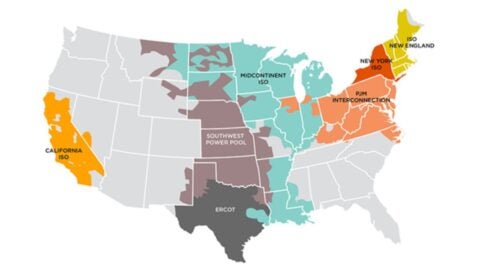
Andrew Wheeler takes the helm at EPA. What’s next for crucial safeguards?
Just last week, the Senate confirmed Andrew Wheeler as EPA administrator. His installation signals a broader pivot point in defending EPA safeguards.
Over the last two years, the Trump administration’s efforts to categorically suspend crucial safeguards without public notice or comment failed across the board.
Looking ahead, Wheeler has almost two years to build on his troubling record by finalizing numerous deeply harmful major rollbacks. These rollbacks, if successful, risk thousands of premature deaths, hundreds of thousands of asthma attacks, and billions of tons of additional climate-destabilizing pollution.
We need to be making more, faster progress towards a clean energy and transportation future – not tearing down the safeguards we have in place.
Here’s a look at where we stand on three major issues — the opportunities we could seize, as well as the challenges ahead.
Power sector pollution: the good news
The good news is there’s tremendous opportunity for progress on clean energy. In many places in the U.S. and globally, building new renewable energy generation is now cheaper than running existing coal plants. Solar projects with new efficient batteries in Arizona and other states will soon be able to provide electricity at a lower cost than new combined cycle natural gas-fired generation.
Dramatic, deep decarbonization for the power sector is within sight. In one heartening example from 2018, Xcel Energy committed to complete decarbonization of its fossil fuel fleet across eight states in the American Midwest and West by 2050.
Power sector pollution: challenges ahead
This pollution reduction progress is not assured, however. Preliminary estimates of power sector carbon pollution for 2018 indicate that emissions rose over the last year due in part to increased reliance on natural gas. Moreover, progress is threatened by the administration’s efforts to prop up uneconomic coal-fired generation and Wheeler’s efforts to undermine safeguards that help ensure that fossil fuel-fired power sources address their harmful pollution burden.
Wheeler is advancing attacks across a broad scope of Clean Air Act programs, benefiting fossil fuel-fired power at the expense of our air and climate:
- Climate safeguards: Wheeler’s proposed substitute for the Clean Power Plan would end any meaningful federal limit on carbon pollution from existing power plants. EPA’s own analysis indicates that by 2030 the proposed rule would result in as many as 1,600 early deaths every year as compared to the Clean Power Plan. Wheeler is also proposing to dramatically weaken carbon pollution standards for new coal-fired power plants, and has even questioned whether power plants should be subject to any carbon pollution limits at all.
- Mercury safeguards: Existing Mercury and Air Toxics Standards reduce mercury, arsenic, lead, acid gases, and fine particulates from coal-fired power plants — saving up to 11,000 lives a year and protecting children from exposure to mercury, a potent neurotoxin. These protections are fully implemented and in effect. Wheeler is proposing to undermine these life-saving standards — an extreme step opposed by labor leaders, the power sector industry, members of Congress from both parties, health organizations, moms’ groups, and faith groups.
- Air quality safeguards: The Clean Air Act includes a “good neighbor” provision that requires EPA to take steps to address pollution from upwind states when this pollution threatens air quality downwind. Wheeler has repeatedly refused to properly apply this provision and protect the millions of individuals living in downwind states that are burdened by upwind power plant pollution.
The Trump administration, meanwhile, continues to threaten a wholesale effort to bail out coal plants to benefit politically connected, economically non-competitive coal plant owners — all under the guise of unsupported arguments that onsite fuel storage supports grid reliability. EPA’s proposed rollback of carbon standards for new power plants, for example, explicitly raises the potential for new coal plants as a result of “federal policy intervention, including mechanisms to incorporate value for onsite fuel storage.” (economic analysis, page ES-3)
Car and truck pollution: the good news
The transportation sector is currently America’s largest source of climate pollution, as well as a major source of other harmful air pollutants. Electric cars and trucks are poised to dramatically transform this sector. A combination of expanding clean electricity and electric vehicles offers the possibility of dramatically reducing pollution from both of these major industrial sectors.
Signs of the transportation transformation are spreading. Leading analysts have predicted that sales of cars with internal combustion engines will peak in 2018. Market analysts see carmakers ramping up production of electric cars and trucks as demand for EVs grows and demand for combustion engine cars falls.
Prices of batteries for electric cars have decreased by nearly 80 percent since just 2010. Analysts predict that prices for a key battery component may drop 45 percent by 2021, signaling that substantial price decreases for electric cars and trucks will continue.
Meanwhile support for clean cars continues to expand. In the U.S., thirteen states and the District of Columbia (most recently joined by Colorado) now follow California’s ambitious clean car standards. Around the world, more and more countries are moving towards cleaner cars—meaning that investing in next-generation clean technologies is essential to keep American industries and American workers globally competitive.
Car and truck pollution: challenges ahead
Unfortunately, actions by the Trump administration would take us in the opposite direction, even though a recent EPA report underscored that a wide range of technologies are available to make progress in addressing pollution. In particular, their current effort to roll back clean car standards threatens American global leadership while risking increased pollution and higher costs for Americans at the gas pump.
Wheeler is advancing several attacks on existing standards that limit pollution from cars and freight trucks:
- Clean car standards: EPA is proposing to dramatically weaken clean car standards, resulting in billions of tons of additional climate pollution and hundreds of billions of dollars in higher gas bills for Americans. The administration has announced its intention to finalize this rollback as soon as March 2019. A major New York Times expose detailed the behind-the-scenes role of oil industry interests in advancing the attack on clean car standards. An article in Scienceconcluded that the rollback’s analytic justification “has fundamental flaws” and “is at odds with basic economic theory.”
- Clean truck standards: Andrew Wheeler continues to threaten to weaken broadly supported clean truck standards. The proposal to repeal all pollution limits for super-polluting “glider” freight trucks remains a threat, although thankfully Wheeler has yet to announce any specific timing for moving ahead with this deeply harmful rollback.
Oil and gas pollution: the good news
Methane is a highly potent greenhouse gas, and the oil and gas sector is the largest industrial source of methane. Early attempts by the Trump Administration to delay EPA protections that reduce harmful methane and smog-forming, toxic and carcinogenic air pollution from new and modified sources in the oil and gas industry were rejected by the courts or abandoned after public opposition.
While the Trump administration continues attempts to rollback these protections at the federal level, states have been moving forward with their own protective standards for oil and gas. Most recently, Wyoming and Pennsylvania have adopted standards, and Governor Michelle Lujan Grisham of New Mexico has directed the state to move ahead with controlling methane waste and pollution.
Oil and gas pollution: challenges ahead
- Partial rollback of existing climate safeguards: Wheeler is proposing to weaken national standards, a step that would increase methane pollution from new and modified oil and gas facilities by over 40 percent —even though EPA’s latest analysis shows the existing standards are even more cost-effective than anticipated. EPA issued the proposal based on concerns about costs to industry and claimed uncertainties about the pollution reductions achieved by the current standards, despite acknowledging that the agency’s own analysis did not support a weakening of the current standards and the fact that the standards have been in full effect and delivering pollution reductions for a year and a half.
- Full rollback for methane on the horizon: Wheeler has also announced plans to attempt to remove methane pollution limits for the oil and gas industry altogether. This looming threat is also presaged in EPA’s proposed rollback of carbon standards for new power plants — where, hidden in a footnote, the agency solicits comment on whether there is a threshold for applicability of 111(b) New Source Performance Standards to greenhouse gases. This suggestion that source categories may escape control if they fall below a certain threshold may foreshadow an attack on any methane pollution limit for the oil and gas sector.
Looking Ahead
Existing EPA safeguards have thus far proved durable in the face of the Trump administration’s onslaught of attacks, thanks to their rigorous foundation in the law and facts as well as widespread push back against Trump rollbacks. These on-the-books protections continue to complement and reinforce dynamic market trends towards cleaner energy.
As Wheeler takes the helm at EPA, we should be thankful for this resilience, but must also remain vigilant in defense of our most important safeguards for human health and the environment.













2 Comments
Gratorama has made it easy for players to seek assistance
seven days a week. If you enjoyed this you might want to click on this link to the look at my other articles.
They also have the $25,00 Cash Sweepstakes.scs https://mayokunoreofeministry.org/definingmoment-crooked-path-made-straight/
Superdry males’s Germany Trophy Series t-shirt.